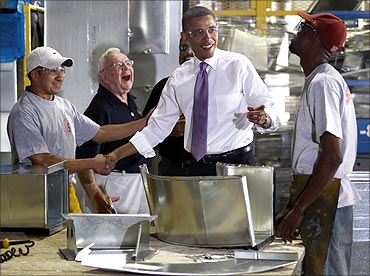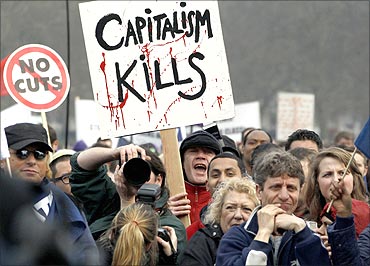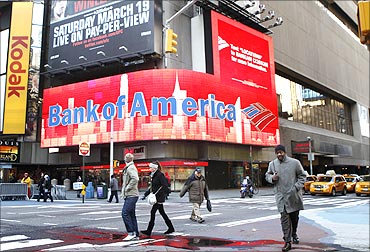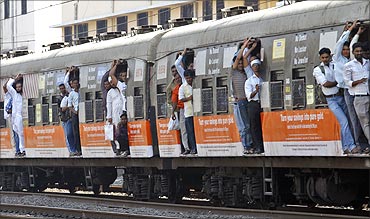Photographs: Lucy Nicholson/Reuters. A V Rajwade
Paul Kennedy had cautioned more than two decades back in The Rise and Fall of the Great Powers, that, at some stage, great powers suffer from "imperial overstretch". Referring specifically to the US, he noted "the awkward and enduring fact that the sum total of the United States' global interest and obligations is nowadays far larger than the country's power to defend all simultaneously it simply has not been given to any one society to remain permanently ahead of all the others". Britain experienced this in the twentieth century, and one wonders whether the US, too, is gradually relinquishing its traditional role. One sign of this is the loss of dollar's status as a safe haven currency.
Is the US relinquishing its superpower status?
Image: US President Barack Obama shares a laugh with workers during a tour of Stromberg Metal Works.Photographs: Jim Young/Reuters.
In a recent speech, US President Barack Obama reminded the audience that the US had gone "down that road in Iraq", where "regime change took eight years, thousands of American and Iraqi lives, and nearly a trillion dollars.
That is not something we can afford to repeat in Libya". Clearly, he is a far more sober and mature president than his juvenile predecessor.
Is the US relinquishing its superpower status?
Image: A boy sells air fresheners on a street in Baghdad.Photographs: Saad Shalash/Reuters.
A couple of years before the turn of the century, the so-called neo-conservatives in the US (a group of right-wing conservative Republican intellectuals, who later dominated the Bush Jr Administration and were the architects of the Iraq invasion) promoted what they described as The Project for the New American Century.
The first manifestation of the New American Century was the regime change in Iraq by invading the country.
Afghanistan and Iraq have since exposed the limitations of American military and economic power, and the surprising incompetence manifested in the post-war occupation.
Is the US relinquishing its superpower status?
Image: Demonstrators attend a rally in Hyde Park, during a protest organised by the Trades Union Congress.Photographs: Kevin Coombs/Reuters.
President Obama has merely recognised the limitations in giving up the leadership of the Libyan operation.
Is the US relinquishing its superpower status?
Image: United Auto Workers (UAW) activists protest against Toyota outside the Japanese Embassy.Photographs: Yuri Gripas/Reuters.
Is the US relinquishing its superpower status?
Image: A pair of housing units are shown for sale in San Francisco.Photographs: Robert Galbraith/Reuters.
The prospects for global inflation have obviously not improved by the continued volatile situation in West Asia and North Africa and its implications for oil prices. (To be sure, some of the western countries and Japan would, in a way, be relieved if inflation reignites as it would be a less painful way of reducing the ratio of public debt-to-nominal GDP than increasing taxes or cutting expenditure.)
Is the US relinquishing its superpower status?
Image: A woman shops for groceries at a Whole Foods supermarket in New York.Photographs: Shannon Stapleton/Reuters.
Stagflation may well be on the cards. One sign of the times is that PIMCO, the world's largest bond fund, has reduced its exposure to US treasuries to zero - it obviously expects yields to go up.
The US monetary policy makers focus on "core inflation" (exclusive of fuel and food prices).
Is the US relinquishing its superpower status?
Image: Pedestrians walk past a Bank of America sign on a building in Times Square in New York.Photographs: Lucas Jackson/Reuters.
Stagflation may well be on the cards. One sign of the times is that PIMCO, the world's largest bond fund, has reduced its exposure to US treasuries to zero - it obviously expects yields to go up.
The US monetary policy makers focus on "core inflation" (exclusive of fuel and food prices).
Is the US relinquishing its superpower status?
Image: Commuters stand at the open doorways of a suburban train during the morning rush hour in Mumbai.Photographs: Reuters.
Tailpiece: Dani Rodrik, when questioned about India, said recently that it is "a thriving economy.
It has a huge potential. I hope it doesn't make the mistakes that other emerging market economies have made - in particular by giving in to the Siren Song of financial globalisation." (The Economic Times, March 25.) I have often argued in this column that we seem to be doing exactly this in terms of capital flows and the exchange rate.











article